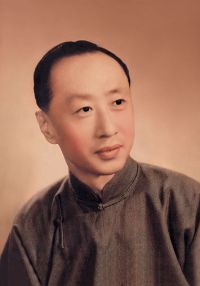Difference between revisions of "Ma Lianliang"
imported>Ciic (Created page with 'thumb|200px|Ma Lianliang 马连良 Ma Lianliang (马连良 1901-1966) China's master performer of old male characters - ''Lao Sheng'' - in [...') |
imported>Ciic |
||
| Line 1: | Line 1: | ||
[[file:Ma Lianliang 马连良.JPEG|thumb|200px|Ma Lianliang 马连良]] | [[file:Ma Lianliang 马连良.JPEG|thumb|200px|Ma Lianliang 马连良]] | ||
| − | Ma Lianliang (马连良 1901-1966) China's master performer of old male characters - ''Lao Sheng'' - in [[Peking Opera]]. | + | '''Ma Lianliang''' ('''马连良''' 1901-1966) China's master performer of old male characters - ''Lao Sheng'' - in [[Peking Opera]]. |
Born in February 28, 1901, Ma Lianliang began studying Peking Opera at the age of eight and started performing at 10. Organizing an opera troupe at 29, he became the leading role on the stage. | Born in February 28, 1901, Ma Lianliang began studying Peking Opera at the age of eight and started performing at 10. Organizing an opera troupe at 29, he became the leading role on the stage. | ||
Revision as of 06:31, 29 July 2011
Ma Lianliang (马连良 1901-1966) China's master performer of old male characters - Lao Sheng - in Peking Opera.
Born in February 28, 1901, Ma Lianliang began studying Peking Opera at the age of eight and started performing at 10. Organizing an opera troupe at 29, he became the leading role on the stage.
Ma absorbed the skills of Tan Xinpei, founder of the Tan School, and integrated fine elements of other master performers. He originated the Ma School that became famous in the 1920s and remained a brilliant performer up to the 1960s.
Ma spared no effort to improve his performance, which was elegant and classic in singing, dialogue and pantomime. His magnum opus including "Borrowing Easterly Winds," "Ganlu Temple," "Huai River Camp" and "Orphan of the Zhao Clan" are popular for Peking opera lovers.
Selected twice as one of the four greatest performers of old male characters, he promoted the development of Peking Opera by implementing reforms in scrip writing, music composition, speech presentation, costumes and props, and stage setting.
